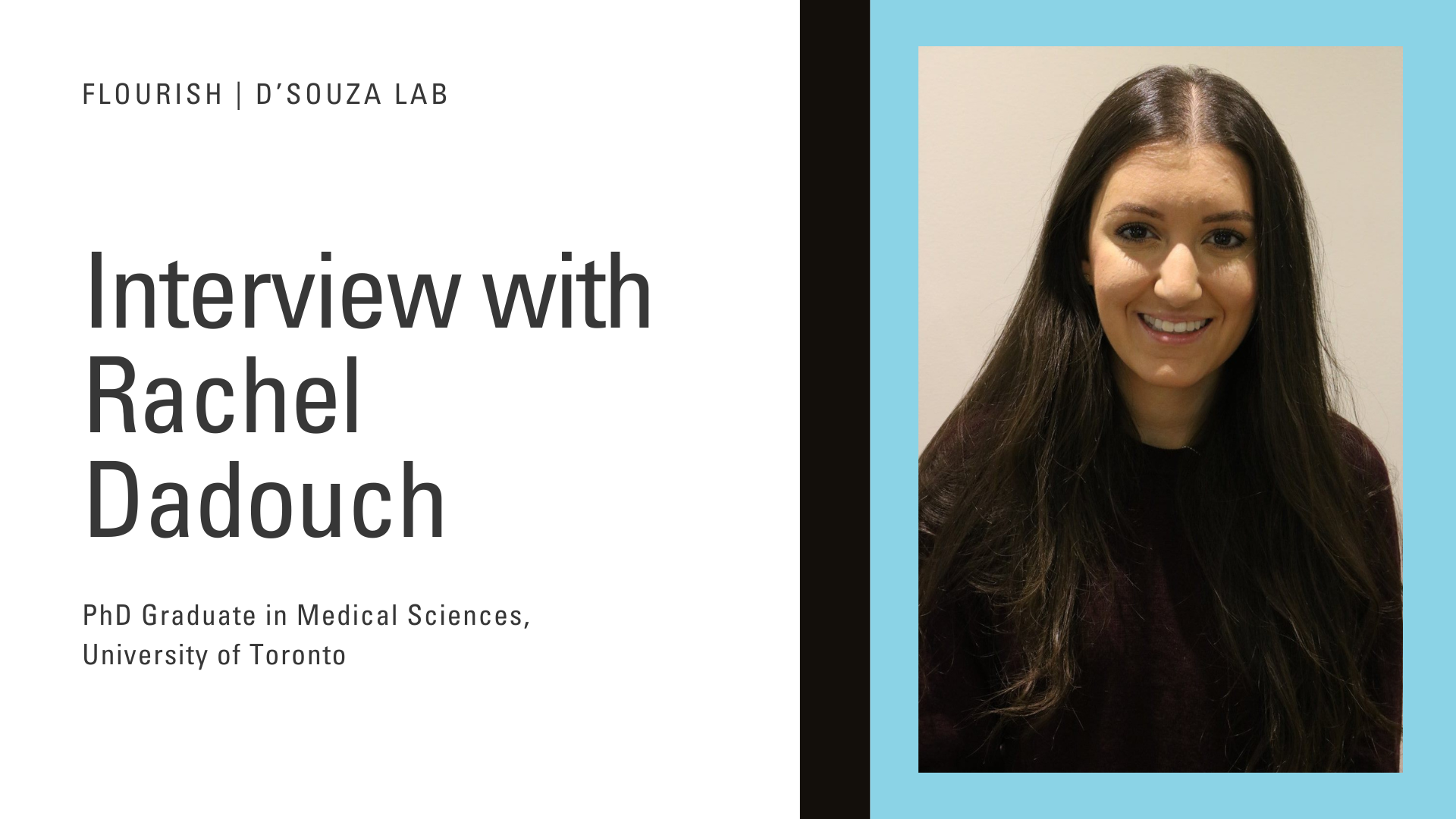Interview with PhD Graduate, Dr. Rachel Dadouch

We spoke with PhD graduate Rachel Dadouch about her research at the University of Toronto with the D’Souza Lab. In the interview below, Dr. Dadouch discusses the important role that communication plays in pregnancy care and shares some memorable experiences from her PhD and helpful advice for those about to embark on their studies.
Tell us about your research.
My research is focused on communication practices between pregnant patients with obesity and their healthcare providers. There are a host of issues that impact the quality of care that patients in this group receive. Patients may feel that their concerns aren’t fully heard or addressed by their care providers, and they may experience weight-related stigma within the healthcare setting. As for clinicians, they may find it challenging to address the medical risks that are present for this patient group while keeping in mind the stigma that patients often face and the emotional harm it can cause.
My work focuses on identifying the communication obstacles, or ‘Narrative Tensions,’ that these two groups encounter when engaging with one another, so that we can improve clinicians’ communication practices going forward.
Why is communication such an important part of pregnancy care?
Communication has a significant impact on the health outcomes that pregnant patients experience. Oftentimes, if a patient has concerns that are not being addressed or that are being excessively addressed by care providers, the patient will avoid seeking care in the future. For instance, pregnant individuals with obesity may be referred to specialized healthcare centres outside of the area in which they live without receiving an explanation from their provider about why they require specialized care. This lack of communication can lead to confusion and distrust, causing patients to avoid asking their doctor questions and advocating for their health. This is why it’s so important that we develop best practices for patient-clinician communication.
What method(s) did you use to conduct your research?
I conducted qualitative interviews with patients and clinicians using a method called narrative inquiry. This approach was useful because it allowed me to use storytelling as my source of data. I engaged patients and clinicians in open-ended interview discussions about their clinical encounters. Patients shared stories about their clinical encounters as well as stories that precede these encounters, and discussed how they shaped their overall experience in pregnancy care. I used this same approach when interviewing clinicians to better understand how they approach conversations related to pregnancy and obesity.
My study was the first in this area to look at both healthcare provider and patient perspectives. I discovered that perspectives varied according to each individual, but not necessarily between patients and healthcare providers. Regardless of whether the participant was a clinician or a patient, the narrative tensions they experienced depended largely on their personal stories, perspectives and beliefs.
How do you see your research being applied in the future?
I’d say the long-term goal of my research is to develop a communication guide for clinicians. As my research shows, every patient has different needs, so I don’t think it’s possible to create a single solution – but it would be valuable to establish a guide that contains advice for clinicians on how to approach conversations with this patient group. Medical education is important as well – we should train healthcare professionals, including family doctors, nurses, midwives and obstetricians, in the early stages of their education about the different conversation scenarios and approaches. My research can hopefully help deepen discussions about this topic and improve training so that clinicians feel more equipped to engage with patients appropriately and productively, and so that pregnant individuals receive high-quality care.
Tell us about a memorable experience from your PhD.
I’d say the most memorable experience of my PhD was seeing my project go from its inception to completion, with the help of my supervisors and committee – who were a major source of support throughout my research project. I’m also proud to have been awarded funding through the Canadian Institutes of Health Research (CIHR) in support of my study.
What advice would you give to incoming PhD students?
You can’t achieve everything in a day. Be patient and consistent when working towards your goals. If you’re inching towards them day by day and seeking support from others when you need it, you’ll reach them. It’s also important to know when you need to push forward and work really hard and when you need to slow down and take a break.
News